In this article, you’ll find 16 case interview tips to help you land a job in Consulting.
All interviews with top consulting firms are divided into 3 parts: the fit interview, the case interview, and the opportunity for the candidate to ask questions.
During a case interview, the interviewer asks you to solve a complex problem in as little as 30 minutes… while carefully scrutinizing every word you say or analysis you do.
And here is the blunt truth: less than 3% of candidates manage to get a lucrative consulting job offer.
But I’ve got good news: this article below shows you 16 case interview tips that will help you be one of those successful candidates.
Let’s get right into those 16 case interview tips now!
Before your interviews: optimize your preparation with these 8 case interview tips:
- #1 – Understand the assessment criteria
- #2 – Develop your (structured) problem-solving skills
- #3 – Develop your analytical skills
- #4 – Develop your business acumen
- #5 – Develop your communication skills
- #6 – Learn this concept of Finance
- #7 – Practice with a focus on quality, not quantity
- #8 – Practice with (ex) Consultants
During your interviews: ace the case study with these 8 case interview tips:
- #9 – Communicate your thought process
- #10 – Be (extremely) structured
- #11 – Think about the Big Picture
- #12 – Demonstrate business judgment
- #13 – Take time to think
- #14 – Make accurate calculations
- #15 – Use ‘educated guesses‘ when concrete data is not provided
- #16 – Keep clean and organized notes
Before your interviews: Optimize Your Prep With These 8 Case Interview Tips
Case interview tip #1 - Understand the assessment criteria
There are 4 skills assessed during case interviews.
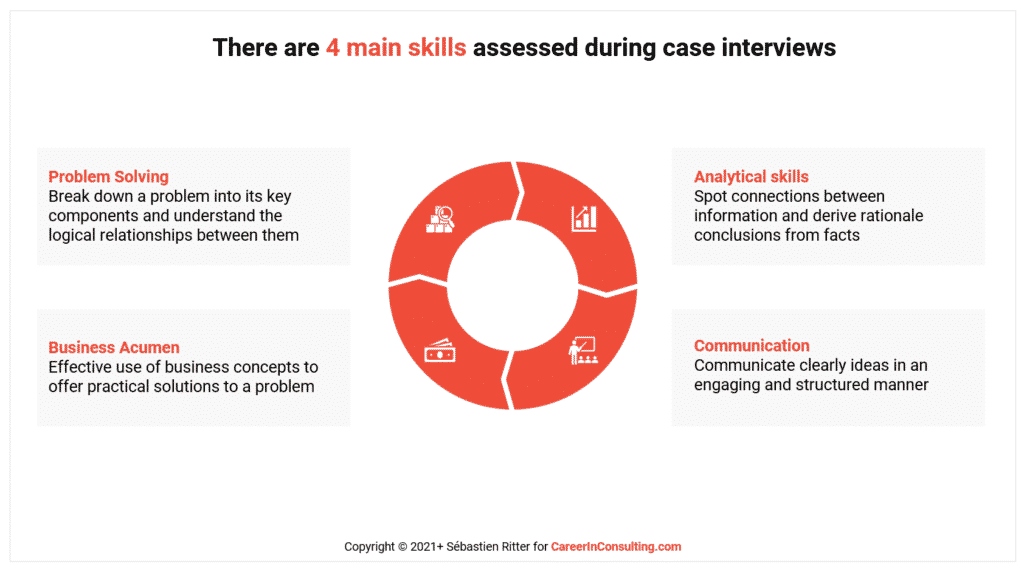
First, your interviewers will assess your problem-solving skills.
Specifically, they want to test your ability to break down a complex problem into smaller and easier-to-manage pieces.
In other words: that’s your capacity to create a MECE issue tree, which is your roadmap to solve the problem.
For instance, here is the evaluation form used by one of the MBB to assess a candidate’s problem-solving skills:

Secondly, your interviewers will assess your analytical skills.
Here, they want to test your ability to analyze a large amount of information and derive useful insights from those analyses (the ‘so what?’).
For instance, here is the evaluation form used by one of the MBB to assess a candidate’s quantitative skills:

Thirdly, your interviewers will assess your communication skills.
Particularly, they want to test if you can express your points clearly and concisely.
Because, as a Consultant, you will do a lot of presentations on different and somehow complex topics.
For instance, here is the evaluation form used by one of the MBB to assess a candidate’s communication skills:

Lastly, your interviewers will assess your business acumen.
Specifically, they want to test your ability to conduct a thoughtful discussion about business issues.
Can you recognize which issues should be prioritized?
Do you offer practical solutions?
Can you think of the implications of a business fact or information?
Those are some sample questions that your interviewers will ask themselves.
For instance, here is the evaluation form used by one of the MBB to assess a candidate’s business acumen:

Now, let’s see some examples of questions that can be asked in case interviews to test those skills.
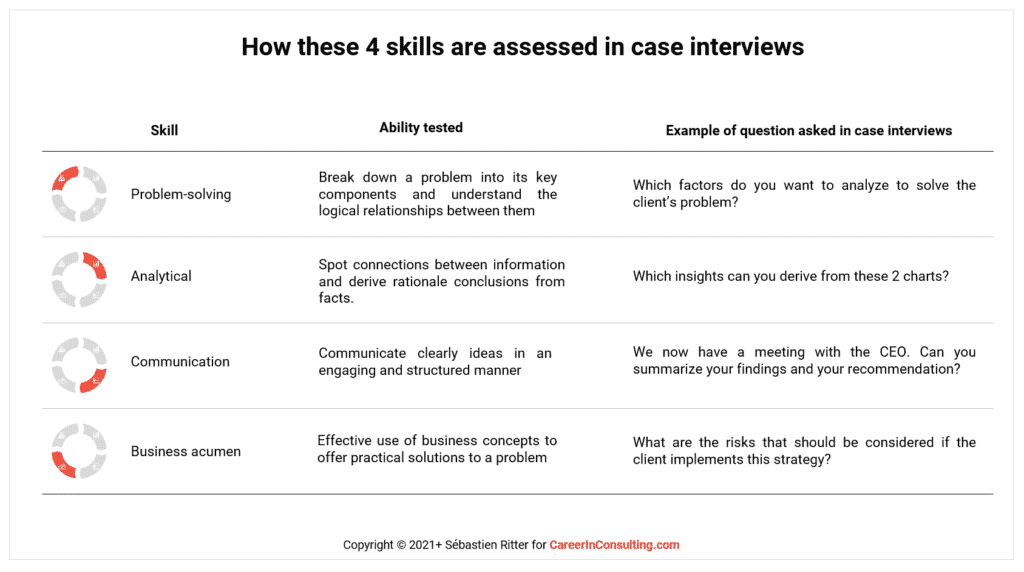
In the next 4 sections of this article, we will look at how to best develop each of these 4 skills before your case interviews.
But before we discuss how to develop those 4 skills, be careful:
It takes time to master those skills and meet the expectations of top consulting firms.
That’s why I recommend starting your prep early.
Ideally, you should start your case interview prep 3 months before your interviews.
However, you can be case-interview-ready in as little as 4 weeks if you have a well-structured plan.
Now, let’s see the second of the 16 case interview tips.
Related article: 11 must-know frameworks to ace your case interviews
Case interview tip #2 - Develop your (structured) problem-solving skills
Consultants consider themselves as professional problem solvers.
This means that they don’t solve a problem by jumping randomly from one analysis to another.
Instead, they approach every problem in a structured way.
To do so, they use several problem-solving techniques, including the famous MECE issue trees.
And, of course, during case interviews, your interviewers will assess your ability to create MECE issue trees.
So, if you struggle with creating MECE issue trees, you can do the following exercise:
A useful exercise to develop your capacity to create MECE issue trees
Step_#1- Pick up a case from this list
Step_#2- To create your initial structure, write on a piece of paper all the factors that can be a root cause or a solution for the problem.
This is a brainstorming exercise, so take your time (even 15 minutes is ok) and be as detailed as possible.
Step_#3- When you have a solid list of factors (target minimum 30 different factors), take another piece of paper and organize the factors you found in categories and subcategories.
Again, take your time. When you organize your ideas into categories, you can find more ideas, which is perfect.
Step_#4- Repeat this exercise with 10-15 different cases. Then you will see many benefits emerging.
First, you will need less and less time to find a solid list of ideas.
Secondly, you should start thinking of the categories and subcategories first (before the detailed ideas). This means that you start thinking top-down (and not bottom-up) about a problem, which is exactly what you must demonstrate during your case interviews.
Now, let’s see the third of the 16 case interview tips.
Case interview tip #3 - Develop your analytical skills
Structuring the case problem well is great, but, to distinguish yourself, you will have to get to the ‘so what?’ ideas in a case.
That’s why, in this paragraph, I will define analytical skills and show you how to improve yours.
So, first, what are analytical skills?
In short, your interviewers want to know if you can gather the right information, analyze this information, and form more complex ideas from it.
In other words: can you turn data into actionable information?
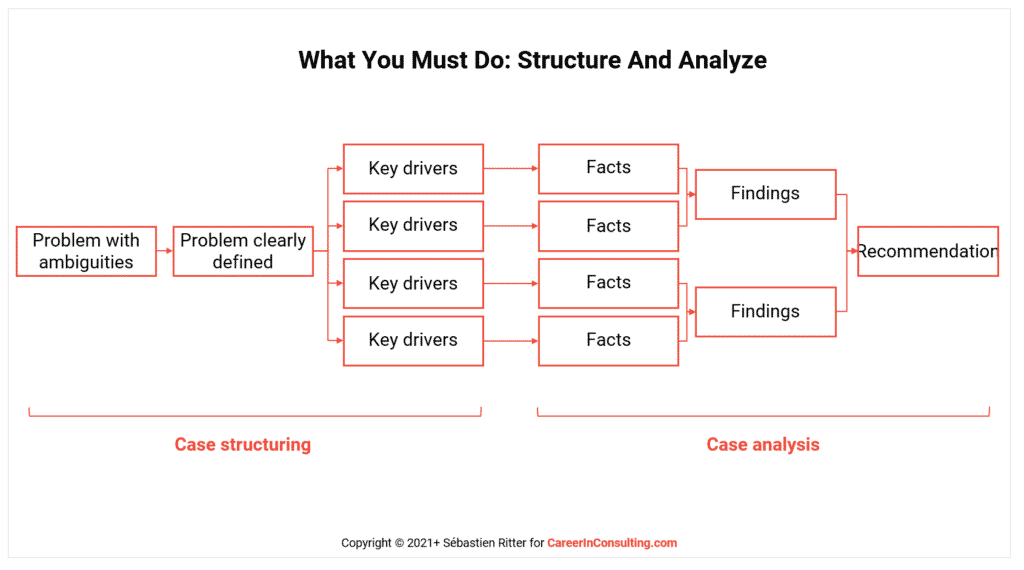
Secondly, how to improve your analytical skills?
Here, I’ve listed 5 ways to develop your analytical skills and crack any cases:
#1- Determine the causal relationship between 2 elements
You will impress your interviewer with your analytical skills if you can easily discuss the cause and effect relationship between 2 facts.
For instance: if a new player enters a market (the cause), your client’s market shares might go down (the effect). Another potential effect: their marketing expenses can increase (to protect their market shares).
Attention: you must be able to make a distinction between correlation (the trending of two or more variables in the same direction) and causation (when a trend in one variable causes a trend to occur in one or more other variables).
Thus, for every data and information provided in a case, ask yourself:
- What’s this data mean for the problem? For my client?
- What are the implications of this data?
#2- Practice with GMAT questions
You can practice both the verbal and quantitative sections of the GMAT to develop your analytical skills.
And all the questions are good exercises to strengthen your analytical thinking.
#3- Talk about a problem or a situation with other people
Here, the goal is to consider opposing viewpoints.
When analyzing data in case interviews, the best candidates can consider all possible interpretations and are not stuck in one way of thinking.
That’s why, talking with someone else about a problem or a business event can expand your perspective, fix the biases you might have, or deepen your way of thinking.
Also, at the end of a practice session, you can discuss with your case buddy the different ways to approach and solve the case problem.
#4- Learn how to read and interpret data
Before analyzing data, it’s important to correctly read the data provided, whether it’s in a chart, a table, or in a text.
To do so, I recommend reading articles in business newspapers (like The Economist).
For instance, you can see how the article details the data represented in the charts and the conclusions made from these charts.
Also, you can read articles from the websites of McKinsey, BCG, or Bain & Company; these articles have many well-commented charts.
For instance, here is an interesting article to read.
#5- Examine past business decisions
I love reading interviews from CEOs.
Because it’s a gold mine of information.
Especially when an article explains why a CEO made a particular strategic decision.
For your prep, read such interviews and list the facts that led a CEO to make a decision.
Now, let’s see the fourth of the 16 case interview tips.
Case interview tip #4 - Develop your business acumen
‘Thinking business’ should seem natural and almost second nature during your interview.
Otherwise, having difficulty developing key business insights can indicate that you may struggle on a consulting engagement, leading to rejection.
One of the useful tactics for learning to ‘think business’ is when you learn about recent business events, try to figure out the (direct and indirect) implications of the event.
For example, imagine that the OPEC nations have decided to restrict the supply of oil.
A first direct implication can be: gas prices will increase, which means that oil company revenues will increase as well.
An indirect implication can be: the sales of SUVs will decrease, which means that Auto companies will be offering more sales promotions on SUVs.
Another indirect implication can be: the use of public transportation will increase.
And so on… you can think of dozens of other implications.
If you want to learn more about how to develop your business acumen, contact me.
Case interview tip #5 - Develop your communication skills
This is probably the skill that is the most difficult to hone.
At least, it was for me…
As a Strategy Consultant, you must speak the CEO-level language, which has 3 characteristics:
- Being concise. A CEO has a busy agenda, so your communication must be sharp and to the point
- Starting from the high-level message and go into details only if needed. Never start by sharing the nitty-gritty details first.
- Being structured. Even if Consultants may sound like robots, this is the best way to be understood when presenting solutions to solve a complex problem.
A good starting point to learn how to speak the C-level language, I recommend reading a book named ‘the pyramid principle’ by Barbara Minto.
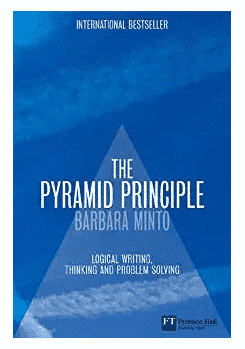
She was the first female partner at McKinsey and she defined the concepts behind C-level communication.
This book is a must-read if you are serious about getting into Consulting.
Case interview tip #6 - Learn this concept of Finance
You don’t need to have a Master in Finance to be a case interview champion.
However, having some basic knowledge of Finance can help you solve a case.
For instance, to determine how to reduce operating expenses, you can use the key components of a P&L (a.k.a. profit and loss statement or income statement).
The P&L statement is a financial statement that summarizes the revenues and costs incurred during a specific period (namely a quarter, a semester, or a full year).
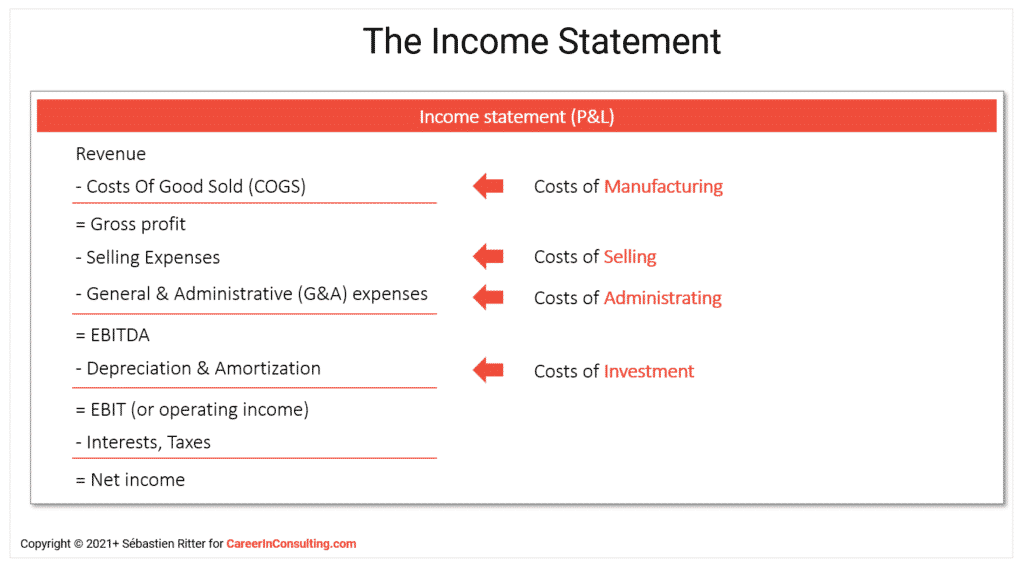
Also, the P&L statement provides a clear view of the 4 cost categories that need to be deducted from revenue to calculate the margin.
#1: The costs of manufacturing (or production): it includes all the costs and expenses directly related to the production of the products or services provided by the company.
COGS is deducted from revenues (sales) to calculate gross profit and gross margin. Higher COGS results in lower margins.
#2: The costs of selling: Selling expenses include the costs of selling (marketing expenses, salaries of sales staff) and distributing the products.
#3: The costs of administrating: G&A expenses include the costs to manage the company (labor costs for IT, HR, etc. + Rent + Utilities, etc.).
#4: The costs of investing: Depreciation is an accounting convention that allows a company to write off an asset’s value over a period of time, commonly the asset’s useful life.
Now, let’s go back to our case interview example of how to reduce operating expenses.
Instead of structuring your cost analysis with the overused Fixed and Variable Costs, you can break down your analysis by using the 4 cost categories above.
Case interview tip #7 - Practice with a focus on quality, not quantity
You already know this: practice makes perfect.
But practice makes it permanent too.
In other words, you can develop bad habits.
Then you can repeat these bad habits during real interviews with a $100k+ job at stake…
Plus, over-practicing can result in mental burn-out and drive your thinking towards frameworks and past cases you’ve seen instead of thinking creatively and independently on the big day.
(That’s the mistake I made when I was first preparing for my interviews)
Thus, here is an exercise you can do to sharpen your case cracking skills without going through 80+ case studies:
Step_#1– Prepare one case that you’ll give as an interviewer.
Step_#2– Give this case to at least 10 different people. They will solve the case using different perspectives and approaches.
Step_#3– Put together the best practices from your peers to build your approach.
Step_#4– Repeat the process with another case.
Also, I recommend creating and maintaining an error log.
In other words: keep track of the mistakes you made and develop a plan to improve your weaknesses.
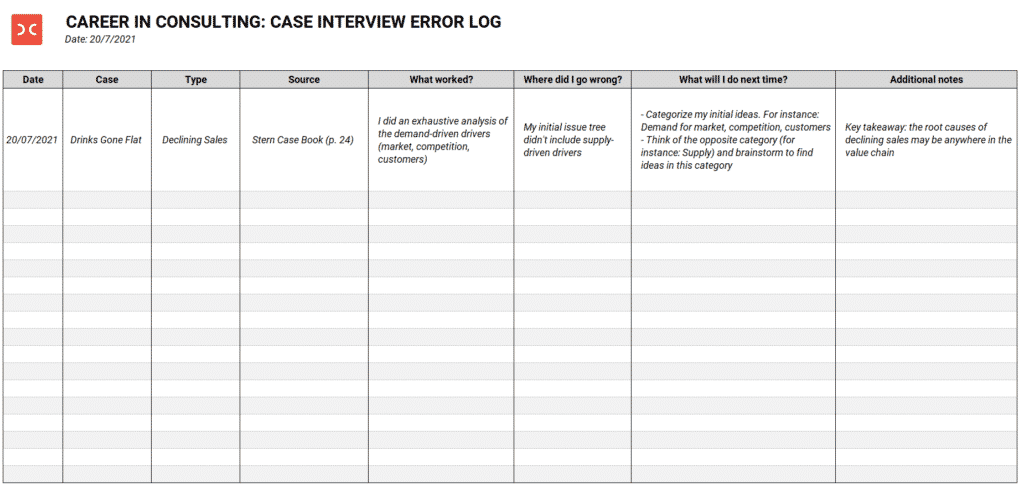
When you review this error log (for instance every week), what kinds of error patterns are you noticing?
Then, your weakest areas must be where you spend the most of your prep time.
Case interview tip #8 - Practice with (ex) Consultants
Relying solely on other beginners / non-consultants is basically “the blind leading the blind” and may result in unproductive feedback (and rejection).
On the other hand, doing a mock interview with a Consultant have many benefits:
- Practice with a real, qualitative case interview example
- Get feedback from an expert and learn how to fix your weaknesses
- Better understand how do you position yourself against other candidates
- Feel more confident and better prepared for the big day
Interesting, don’t you think?
So, before the interview, you must build relationships with Consultants at your target firms.
For instance, you can:
- Attend as many events as possible for the firms that interest you. At these events, talk to as many people as possible to make a good impression.
- Have a good set of questions to ask firm representatives to show your level of interest in the company.
- Get the contact information for each person with whom you speak and follow up with an email after the event.
- Important: always make a positive impression when interacting with company representatives. Assume that all interactions with a firm’s employees can affect your standing.
Finally, I recommend doing mock interviews with Consultants only when you’ve reached an intermediate level.
Feedback from Consultants should be relied upon to sharpen your case cracking skills, not initiate them.
Get 4 Complete Case Interview Courses For Free

You need 4 skills to be successful in all case interviews: Case Structuring, Case Leadership, Case Analytics, and Communication. Join this free training and learn how to ace ANY case questions.
During Your Interviews: Ace The Case Study With These 8 Case Interview Tips
Case interview tip #9 - Communicate your thought process
This is important:
During your case interviews, the game you’re playing is NOT to find the right answer.
There is no right or wrong answer.

Instead, the game you’re playing is to show your interviewers how you think.
In other words, they want to understand your thinking process.
Therefore, make sure you always communicate clearly your reasoning and your assumptions.
Talking through what’s going through your mind (in general terms) can give the interviewer a chance to give you correct information if you’ve got something mixed up or ask follow-up questions to gain more insight about you as a candidate.
This tip goes for when you’re doing your math, brainstorming, and providing some sort of insights in response to a question.
Finally, as mentioned in the case interview tip #5, read the book named The Pyramid Principle to learn about how to talk like a Consultant.
Case interview tip #10 - Be (extremely) structured
STRUCTURE, STRUCTURE, STRUCTURE!!!
This is one of the most important case interview tips.
Being structured is the thing you should focus on most from the start of the interview until the end.
Structure everything from the paper that you take your notes on…to the way you do your initial case issue breakdown…to your setup and execution of the math…to what you say in your final case wrap-up.
And having a structured approach to everything you do in a case interview is more important than getting the “right” answer to “crack” the case.
For instance, you won’t get an offer if you don’t know how to break down case problems into distinct segments to create a structured roadmap.
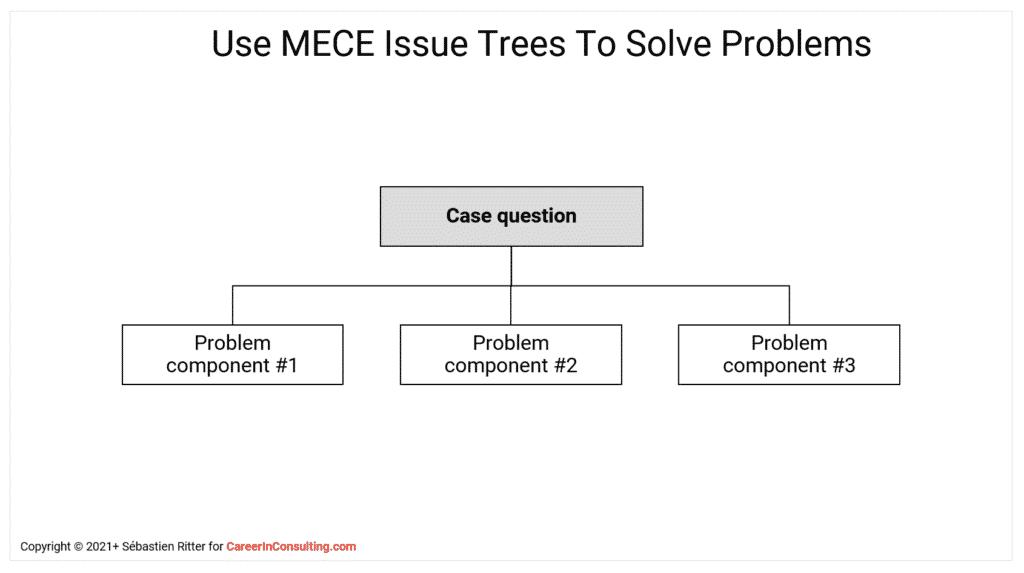
Also, be sure that your problem components are MECE.
- Mutually Exclusive: there is no overlap between the issues to be investigated
- Collectively Exhaustive: all potential issues have been identified and are present in your issue tree
Finally, be creative.
This is pretty self-explanatory, but try not to get bogged down and restricted to the format or ideas that a particular framework might lead you to.
There are many ways to solve a problem and a little creativity may be just what it takes to get you over the top when the interviewers are doing their evaluations.
Case interview tip #11 - Think about the Big Picture
Think about the “Big Picture” whenever you can in your case interviews… don’t dig too deep in the details until you have to.
Digging too deep early and getting lost “in the weeds” can lead to missing out on information that might get you to the desired answer.
If the first thing that pops into your mind is the details of what information you want, take an extra second to think about why you need that information and it will likely give you another layer of structure for your analysis.
The “Big Picture” thinking should be the foundation of your approach at all stages of the case, but it is especially important when you’re doing your initial case “roadmap” and issue tree.
The executives and managers that you’d be consulting to will likely have a “Big Picture” view of things, so you should train yourself to have the same sort of outlook.
Case interview tip #12 - Demonstrate business judgment
- Prioritize the case discussion on the most important issues
- Make practical and tangible recommendations
- Is this issue large or small relative to the others?
- Is my recommendation practical?
- Will my recommendation make a difference in the short life span of an investor or CEO tenure?
- Knowing the risks, is this how I would spend my money if I were accountable?
Case interview tip #13 - Take time to think
Take time to think about what you’re going to say before you say it.
There is nothing wrong with taking 5 or 10 seconds to think through something when the alternative is simply saying the first thing that comes to mind.
Remember, you’re not in a race against the clock…you’re in a race to get a Consulting offer.
Case interview tip #14 - Make accurate calculations
When I coach people I’m always very strict with this rule:
NEVER round numbers.
Most interviewers don’t like it and can reject you if you round numbers.
Why?
First, believe it or not, but for Consultants, there is a strong correlation between your mental math skills and your chances to be a successful Consultant.
Secondly, if they give you numbers to compute in a case interview, test your quantitative skills, not how good you are at simplifying the calculations.
Thus, you must learn some math tricks to answer math questions accurately and quickly, even in a stressful context like a case interview.
For instance, you can use the rule of 10’s and the rule of halves.
This rule consists of breaking difficult numbers into either tens or halves to do quick calculations.
Example: what is 37% of 25,000?
- 25,000 / 10 = 2,500 => 10% of 25,000
- 2,500 / 2 = 1,250 => 5% of 25,000
- 2,500 / 10 = 250 => 1% of 25,000
- From the above, you can answer the question: (3 x 2,500) + 1,250 + (2 x 250) = 7,500 + 1,250 + 500 = 9,250 = 37% of 25,000
A last piece of advice: do not try to do calculations in your head unless you’re sure you can solve them correctly.
Case interview tip #15 - Use ‘educated guesses‘ when concrete data is not provided
Finding the balance between when and when not to use assumptions is a tough question.
So I always default to the following rule of thumb…
If you need a piece of information during the case, ask for it.
The worst that can happen is that the interviewer won’t have the information and you’ll have to make an assumption (an ‘educated guess’) about it.
And the alternative to not asking is making an invalid or incorrect assumption and going down the wrong path when the interviewer had a ton of data waiting for you all along.
Basically, use assumptions within reason and know that, in many cases, the interviewer likely has data that can help you crack the case wide open if you use it right.
In case you have to make assumptions:
- Say out loud what your underlying hypotheses are
- Use numbers that are easy to compute
- Leverage the information already disclosed in the case to come up with ‘realistic’ assumptions
- Or leverage information you know from comparable industries to come up with ‘realistic’ assumptions
A last piece of advice: do not try to do calculations in your head unless you’re sure you can solve them correctly.
Now, let’s see the last of the 16 case interview tips.
Case interview tip #16 - Keep clean and organized notes
This case study tip is about note-taking in case interviews.
A good reason for having clear notes is so that you don’t confuse yourself during interviews.
When under the stress of an interview situation, it is easy to lose track of a number, a fact, or some piece of data that could help you solve a problem.
And the time it takes to find that lost data is time that you could be plugging away at your case analysis.
Neat note-taking is a simple way to avoid that problem.
So how to take neat notes?
With these 3 tactics:
First, use 3 separate sheets of paper (landscape-oriented).
- One sheet of paper for your structure (your MECE issue tree)
- The second sheet of paper for the facts & data given by the interviewer
- Another sheet of (scrap) paper for math calculations
Important: even if you are doing some calculations in your head, be sure to write our solutions down so you can refer back to them later.
Secondly, use tables to demonstrate structured presentation of information.
For instance, you can organize your notes (and the calculations you must perform) like this:
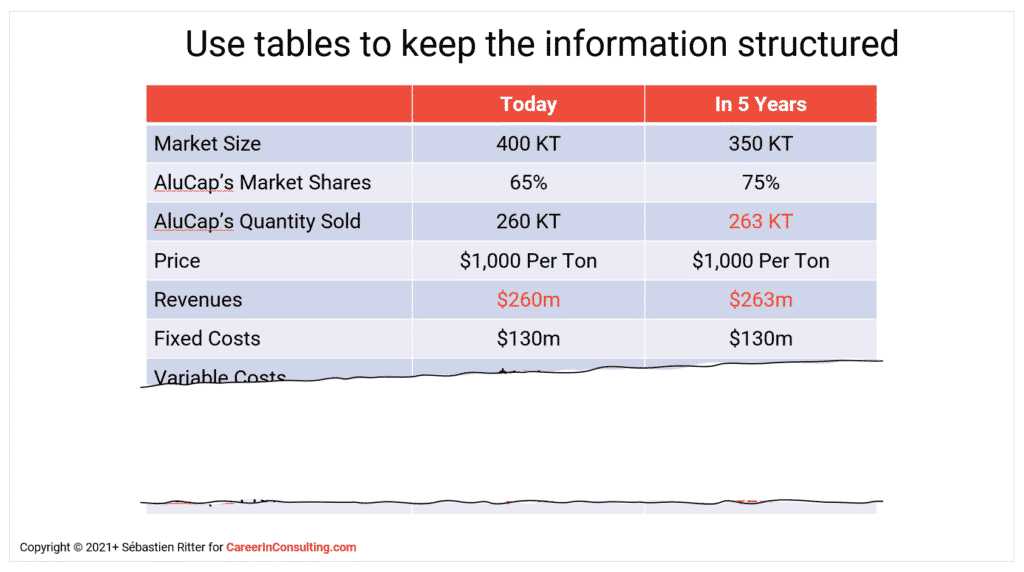
Lastly, write in pencil.
This may seem basic, but being able to erase mistakes can go a long way toward producing clean and easy-to-read notes.
Conclusion
That wraps up the 16 case interview tips and techniques presented in this article.
I hope you found those 16 case study tips interesting and useful.
Now, it’s time to hear what you have to say.
Were any of these case study interview tips new or surprising? Or maybe you have a question.
Either way, let me know your thoughts in the comments section below.
Sébastien
Get 4 Complete Case Interview Courses For Free

You need 4 skills to be successful in all case interviews: Case Structuring, Case Leadership, Case Analytics, and Communication. Join this free training and learn how to ace ANY case questions.
